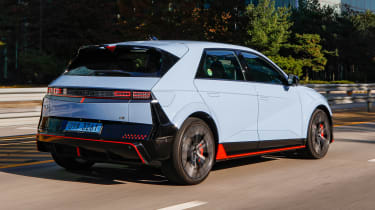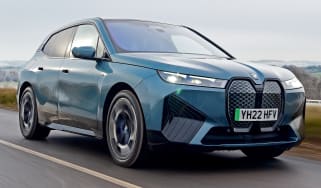New Hyundai Ioniq 5 N 2023 review: a stunning electric performance car
The new Hyundai Ioniq 5 N sets the benchmark for driver focused electric performance cars

Verdict
By successfully mimicking the firm’s excellent petrol hot hatchbacks, the Hyundai Ioniq 5 N sets a new benchmark for driver-focused electric performance cars. So much so, after only a few minutes on track we completely forgot we were driving a family-friendly, five-door EV. The ride might be a little firm for some, but as an all-round package offering pace, practicality and even the potential for rock-bottom running costs, nothing can touch the new N right now.
How do you make an electric car genuinely fun to drive? Many have tried and, to a lesser or greater extent, most have failed. But Hyundai reckons its lauded N department has the answer, encapsulated by its latest creation: the Ioniq 5 N.
This is a car that its maker insists “sets the benchmark for sporty EVs”. That’s a bold claim in anyone’s book – not least when it’s backed by Hyundai Motor Group’s executive technical advisor and ex-BMW M boss, Albert Biermann.
On paper, the Ioniq 5 N appears to have been given a pretty extensive engineering overhaul. Indeed, we could go on forever just talking about the myriad settings Hyundai lets you alter via the car’s infotainment screens.
As well as hardware changes like the wider track, stiffened suspension, bigger wheels and bespoke Pirelli tyres, there is an almost-daunting number of tech tweaks at play below all the aluminium and Alcantara. The dual-motor powertrain is uprated to 601bhp, for example, briefly boosted to 641bhp in the car’s most ferocious N mode.
More reviews
Car group tests
- Hyundai Ioniq 5 vs Kia EV6: 2022 twin test review
- Toyota bZ4X vs Volkswagen ID.4 vs Hyundai Ioniq 5: 2022 group test review
- Mercedes C 220 d Estate vs BMW 330e Touring vs Hyundai Ioniq 5: 2022 group test review
In-depth reviews
Long-term tests
Road tests
Then comes the wizardry – some naff, some not. Firing the car up or clambering aboard at an idle, you’d be forgiven for thinking you were sitting in one of Hyundai’s petrol hot hatchbacks. The maker calls it N Sound+ and it’s designed to mimic the turbocharged engine from an i30 N. It’s subtle rather than intrusive, and can be turned off completely if you remain unconvinced.
Our advice would be to leave it on, however. It’s just one piece of a very complex puzzle that, brought together, makes for what is unquestionably the most entertaining EV we’ve ever driven. Forget your BMW i4 M50 or Porsche Taycan Turbo – the Ioniq 5 N is the new enthusiast’s yardstick.
Allow us to elaborate. That N Sound+ system works in conjunction with Hyundai’s new N e-shift setup, which was developed by the same team responsible for the eight-speed DCT gearbox available in the petrol-powered i30 N. But instead of just pumping engine and shift sounds into the cabin, it simulates real gear changes with a physical jolt felt through the car’s chassis, and it even rev-matches on downshifts. You can use the steering wheel paddles to initiate the equivalent of engine braking, or change up early to mimic lower revs. It even adjusts the torque available in each gear to give a turbo lag-like sensation.
If this all sounds like a bit of a novelty, we’d encourage you to sample it on a circuit. Within minutes we’d almost forgotten we were driving an electric car – shifting down into corners before hammering home lightning-fast changes on the exit. This, mated to the new N-Pedal regenerative braking setup, makes for a surprisingly formidable track car. The 5 N will also allow simultaneous operation of the accelerator and brake pedals – not normally possible in an EV.

Biermann said his team of engineers were faced with the challenge of making “a 2.2-tonne elephant dance” – but the results are astonishing. The steering is razor sharp and beautifully weighted, and those aforementioned brakes offer loads of feel when you’re not using the intuitive regen modes.
Furthermore, this is a car that, thanks to its various settings, can be dialled from front to rear-wheel drive (N Torque Distribution) in an instant. Do so, and the car will happily swing its tail out in a steady and controllable manner – even without initiating the N Drift Optimizer. Tired of these countless N-branded functions yet? Well, there’s more…
While it’s of little use outside of the occasional illicit traffic-light drag race, the Ioniq 5 also gets N Launch Control, allowing it to rocket from 0-62mph in just 3.4 seconds. This, synchronised with N Grin Boost (yes, really) and N Race, unlocks the car’s full potential for short track sessions.
Track time is something Biermann thinks is incredibly important to N customers and an event he says is enabled by the Ioniq 5 N’s 800-volt architecture, which it shares with the standard car. It allows for improved battery conditioning and reliable recharge times; in normal driving Hyundai estimates a 280-mile range, and a top-up to 80 per cent full in just 18 minutes. The fastest 5 also features an endurance mode which dials things back ever so slightly to eke out extra laps.
Our one concern, which is of little consequence on track but could prove tiresome on UK roads, is the ride. Bosses insist this is the most comfortable N yet, but even in its slackest settings there’s a definite firm edge to the car. This could be considered a necessary trade-off for the tight body control, but rivals manage to better blend sharp handling with a more fluid, softer feel for daily driving.
Otherwise, though, the Ioniq 5 N is perfectly set up for the more mundane stuff. There’s loads of space in the back seats and boot, and while up front you get a more cocooned, driver-focused ambience than in the standard car, all the tech you expect is present and correct. That means the same dual-screen layout and responsive infotainment system, plus shortcut buttons for the media controls and a touch-sensitive panel beneath allowing access to the heating and ventilation.
Quality, by and large, is very good, but perhaps more befitting of the normal Ioniq’s £45-50k price than the N’s £65,000 starting figure. That said, there’s some Alcantara on the steering wheel and the sculpted bucket seats are not only supportive, but comfortable too. Customers are unlikely to feel short-changed, but it’s some way off a Taycan or even an i4 for perceived quality.
And while that price might appear rather lofty for a Korean hatchback, the kit list is strong. In addition to all those cheesy-sounding N goodies, every car comes with 21-inch wheels, LED lights front and rear, heated and ventilated seats, twin 12.3-inch screens with Apple CarPlay and Android Auto, and a head-up display. There’s also a heat pump to help protect range in the colder months, as well as a long list of active and passive safety features. The only option, apart from paint, is a single-piece panoramic roof for £1,250.
| Model: | Hyundai Ioniq 5 N |
| Price: | £65,000 |
| Powertrain: | 84kWh battery, 2x e-motors |
| Power/torque: | 641bhp/740Nm |
| Transmission: | Single-speed auto, four-wheel drive |
| 0-62mph: | 3.4 seconds |
| Top speed: | 162mph |
| Range: | 280 miles |
| Charging: | 240kW, 10-80% in 18mins |
| Dimensions (L/W/H): | 4,715/1,940/1,585mm |
| On sale: | Now |








